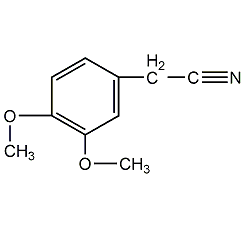
Structural formula
| Business number | 025Y |
|---|---|
| Molecular formula | C10H11NO2 |
| Molecular weight | 177.20 |
| label |
(3,4-Dimethoxyphenyl)acetonitrile, Veratrum nitrile, 3,4-Dimethoxybenzonitrile, 3,4-Dimethoxy-benzeneacetonitril, 3,4-Dimethoxybenzyl cyanide |
Numbering system
CAS number:93-17-4
MDL number:MFCD00001911
EINECS number:202-225-1
RTECS number:AL9325000
BRN number:1956100
PubChem number:24847718
Physical property data
1. Character:Solid crystal
2. Density (g/mL,25/4℃):1.053
3. Relative vapor density (g/mL,AIR=1): Undetermined
4. Melting point (ºC): 64-66
5. Boiling point (ºC,Normal pressure): Undetermined
6. Boiling point (ºC,1.33kPa):171-178
7. Refractive index: Undetermined
8. Flashpoint (ºC): 250
9. Specific optical rotation (º): Undetermined
10. Autoignition point or ignition temperature (ºC): Undetermined
11. Vapor pressure (kPa,25ºC): Undetermined
17. Explosion limit (%,V/V): Undetermined
18. Lower explosion limit (%,V/V): Undetermined
19. Solubility: Undetermined
Toxicological data
None yet
Ecological data
None yet
Molecular structure data
1. Molar refractive index: 49.07
2. Molar Volume (m3/mol):163.6
3. isotonic specific volume (90.2K):405.5
4. Surface Tension (dyne/cm):37.7
5. Polarizability(10-24cm3):19.45
Calculate chemical data
1. Reference value for hydrophobic parameter calculation (XlogP): None
2. Number of hydrogen bond donors: 0
3. Number of hydrogen bond acceptors: 3
4. Number of rotatable chemical bonds: 3
5. Number of tautomers: none
6. Topological molecule polar surface area 42.2
7. Number of heavy atoms: 13
8. Surface charge: 0
9. Complexity: 196
10. Number of isotope atoms: 0
11. Determine the number of atomic stereocenters: 0
12. Uncertain number of atomic stereocenters: 0
13. Determine the number of chemical bond stereocenters: 0
14. Number of uncertain chemical bond stereocenters: 0
15. Number of covalent bond units: 1
Properties and stability
None yet
Storage method
This product should be kept sealed and dry.
Synthesis method
From o-dimethoxybenzene ([91-16-7]), via methyl chloride Derived from base and cyanide.
Purpose
Used as an intermediate in organic synthesis.
75pt; TEXT-ALIGN: left; mso-list: l0 level2 lfo1; mso-margin-top-alt: auto; mso-margin-bottom-alt: auto; tab-stops: list 36.0pt” align=left>3. Isotonic specific volume ( 90.2K):405.5
4. Surface Tension (dyne/cm):37.7
5. Polarizability(10-24cm3):19.45
Calculate chemical data
1. Reference value for hydrophobic parameter calculation (XlogP): None
2. Number of hydrogen bond donors: 0
3. Number of hydrogen bond acceptors: 3
4. Number of rotatable chemical bonds: 3
5. Number of tautomers: none
6. Topological molecule polar surface area 42.2
7. Number of heavy atoms: 13
8. Surface charge: 0
9. Complexity: 196
10. Number of isotope atoms: 0
11. Determine the number of atomic stereocenters: 0
12. Uncertain number of atomic stereocenters: 0
13. Determine the number of chemical bond stereocenters: 0
14. Number of uncertain chemical bond stereocenters: 0
15. Number of covalent bond units: 1
Properties and stability
None yet
Storage method
This product should be kept sealed and dry.
Synthesis method
From o-dimethoxybenzene ([91-16-7]), via methyl chloride Derived from base and cyanide.
Purpose
Used as an intermediate in organic synthesis.

 微信扫一扫打赏
微信扫一扫打赏

